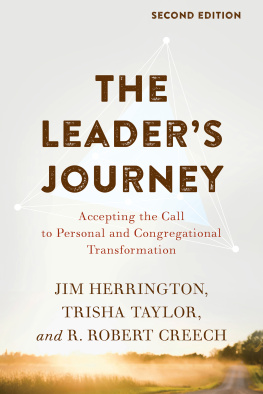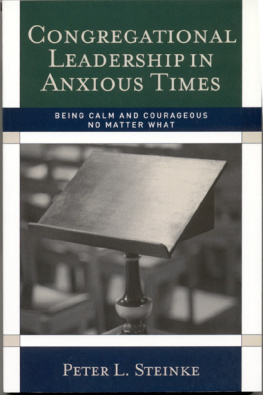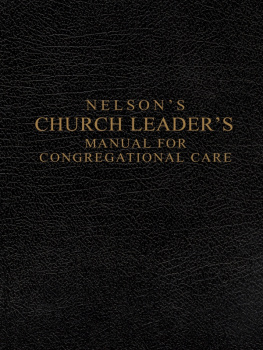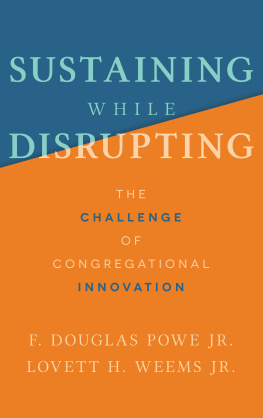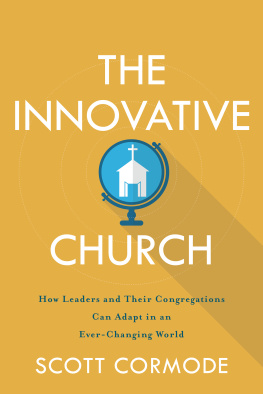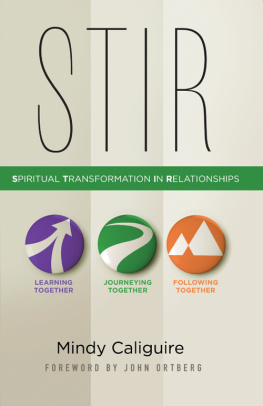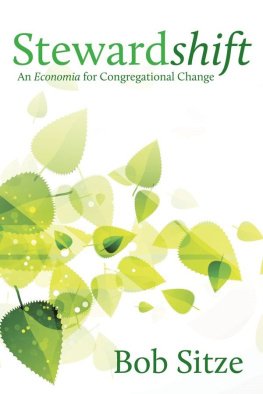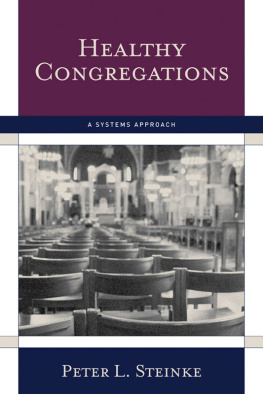Copyright Page
2003, 2020 by Jim Herrington, Trisha Taylor, and R. Robert Creech
Published by Baker Academic
a division of Baker Publishing Group
PO Box 6287, Grand Rapids, MI 49516-6287
www.bakeracademic.com
Ebook edition created 2020
All rights reserved. No part of this publication may be reproduced, stored in a retrieval system, or transmitted in any form or by any meansfor example, electronic, photocopy, recordingwithout the prior written permission of the publisher. The only exception is brief quotations in printed reviews.
Library of Congress Cataloging-in-Publication Data is on file at the Library of Congress, Washington, DC.
ISBN 978-1-4934-2212-8
Scripture quotations labeled ESV are from The Holy Bible, English Standard Version (ESV), copyright 2001 by Crossway, a publishing ministry of Good News Publishers. Used by permission. All rights reserved. ESV Text Edition: 2011
Scripture quotations labeled Message are from THE MESSAGE, copyright 1993, 1994, 1995, 1996, 2000, 2001, 2002 by Eugene H. Peterson. Used by permission of NavPress. All rights reserved. Represented by Tyndale House Publishers, Inc.
Scripture quotations labeled NIV are from the Holy Bible, New International Version. NIV. Copyright 1973, 1978, 1984, 2011 by Biblica, Inc. Used by permission of Zondervan. All rights reserved worldwide. www.zondervan.com. The NIV and New International Version are trademarks registered in the United States Patent and Trademark Office by Biblica, Inc.
Scripture quotations labeled NRSV are from the New Revised Standard Version of the Bible, copyright 1989 National Council of the Churches of Christ in the United States of America. Used by permission. All rights reserved.
Dedication
To the next generation and the one after thatour children and grandchildren, who bless our lives immeasurably.
Emily Hartzog (Haley, Abi, and Madi), James Herrington, Nathan Herrington, Ryan Donovan, and Amanda and Jeremy Stewart (Elliot, William, Oliver, and Gavin)
Alan and Kat Creech (Madison and Austin), Taylor and Amber Creech (Ava and Jonas), and Nathan and Jenna Amber
Andrew Taylor and Rebecca Taylor
Contents
Cover
Half Title Page
Title Page
Copyright Page
Dedication
Preface
Acknowledgments
Introduction
Part One: The Call to Personal Transformation
1. The Need for Personal Transformation
2. Following Jesus on the Leadership Journey
Part Two: Leading Living Systems
3. Understanding the System
4. Thinking Systems, Watching Process
5. Becoming a Calm Leader
6. Leading in Uncertain Times
Part Three: Family Patterns
7. Going Home Again
8. The Nuclear Family
Part Four: The Spirit and the Journey
9. The Spiritual Life and the Path to Transformation
10. Learning to Learn Again
11. Thinking Systems as a Christian
Epilogue
Appendix B: Developing a Rhythm of Spiritual Practices
Appendix C: Bowen-Based Training Programs
Recommended Reading
Glossary
Notes
Index
Back Cover
Preface
W hen the first edition of The Leader s Journey appeared, none of us imagined how well readers would receive the book or the impact it would have on our personal lives. Back then Robert was the pastor of a large church in the Houston area, Trisha was a pastoral counselor in private practice in Houston, and Jim was serving as an executive for a Houston-area denominationally based group of churches.
Today Robert teaches pastoral leadership at Baylor Universitys George W. Truett Theological Seminary in Waco, Texas. Each semester he trains seminary students in the principles of living systems. Additionally, he speaks at national conferences on family systems, leadership, and pastoral ministry. He has authored Family Systems and Congregational Life: A Map for Ministry and coauthored, along with Joe E. Trull, Ethics for Christian Ministry: Moral Formation for Twenty-First Century Leaders .
Trisha and Jim have worked together on multiple pilot projects across the country, teaching the principles of living systems to hundreds of pastors and congregational leaders. They have focused on integrating the principles of living systems into a Christian understanding of spiritual formation. Working with many congregations over a multiyear period, they have seen firsthand the impact of practicing living-systems principles. They have shared much of their learning in their 2017 publication, Learning Change: Congregational Transformation Fueled by Personal Renewal . Today they offer leadership-development coaching based in living-systems principles to leaders across the country through their business initiative, The Leaders Journey: Coaching for Wholehearted Leadership (http://theleadersjourney.us/).
The need has never been greater for leaders who understand living systems and the power of calm leadership in the face of anxiety and enormous, ongoing change. We hoped the first edition of The Leaders Journey would help our pastoral colleagues. We offer this second edition with a conviction that work of this kind is essential to the core curriculum of any leader who hopes to thrive in todays context.
Acknowledgments
T he first edition of this book opened with the following acknowledgment: An amazing thing is happening in Houston. Although the city is large, dynamic, and highly complex, a community of pastors and ministry leaders is emerging with a shared vision for the transformation of our city. It is our privilege to be a part of that community and to find a profound sense of blessing there. Fifteen years later, in the wake of Hurricane Harvey, it is more obvious than ever that what was then emerging has become well-formed and functional. We continue to be deeply grateful to be in this city with these leaders who continue to learn together. Our work continues in some large measure because of the friendship, encouragement, and challenge of so many in Houston.
Although we take full responsibility for the content of the manuscript, this is truly an effort of the learning communities in which we participate. For ten years Jim and Trisha have co-labored with the Faithwalking community (http://www.faithwalking.us/), a ministry that seeks to foster spiritual formation work in seminaries and congregations across the country. Ken Shuman, Marcos Leon, Todd McCombs, and the team of people who lead this international ministry have been pivotal in our ongoing growth and development. We have had a similarly important journey with Ridder Church Renewal (RCR), an initiative named for philanthropists and theologians Bud and Lenora Ridder, whose imagination and generous grant made this initiative possible. RCR is a collaborative effort of the Reformed Church in America, the Christian Reformed Church in North America, and Western Theological Seminary in Holland, Michigan, that focuses on personal and congregational transformation. For nearly a decade, participating congregations and congregational leaders in this initiative have tested and refined the ideas in this book.
Roberts learning community for the past nine years has comprised primarily theological students at Baylor Universitys George W. Truett Theological Seminary in Waco, Texas. Their authentic and insightful questions about Bowen Theory have refined his thinking. The resolution of many to begin to work on themselves in their own families has encouraged him in this effort.
Victoria Harrison is a member of the faculty at the Bowen Center in Washington, DC, and lives and practices in Houston. She has served as coach and teacher along the way and has personally invested time, energy, and money in coaching and in developing educational programs through the Center for the Study of Natural Systems and the Family in Texas, affecting the lives of many families over several decades. We are especially grateful for her interest in issues faced by clergy, both in their families and in their congregations.

